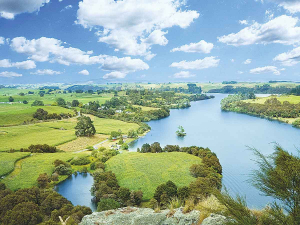94% of NZ farmers oppose Paris Agreement, survey shows
A survey of 2000 farmers shows 94% of respondents believe that remaining in the Paris Agreement for climate change is not in the country's best interest.
 Groundswell NZ is calling on all landowners to refuse access to public agencies undertaking surveys on private land.
Groundswell NZ is calling on all landowners to refuse access to public agencies undertaking surveys on private land.
After months of agitation and meetings around the country, a rural advocacy group has launched what it describes as the "first in a range of actions" to mobilise farmers against unworkable regulations.
Groundswell NZ is calling on all landowners to refuse access to public agencies undertaking surveys on private land - including Significant Natural Areas (SNA) and wetland surveys.
"Under the new Freshwater and Indigenous Biodiversity regulations, the Government is proposing it be mandatory for councils to survey all land within their districts for SNA assessments and wetlands," Groundswell NZ spokesman Bryce McKenzie claims.
He says farmers and landowners around the country are concerned about the misuse of this survey information.
"It has no caveats to protect landowners' privacy interests and no compensation of the impacts on property values," McKenzie adds.
"This shows a lack of respect for landowners who have been proactive in conservation. We already have a proven successful system with the QEII Trust covenants, which help landowners protect areas on private land."
Last week, Groundswell NZ wrote to all councils around the country demanding they halt mapping of natural areas on private land until these outstanding concerns were resolved.
"We have already had some councils indicate support for out campaign, as they too are fed up with the heavy hand of government and loss of flexibility for councils and communities to design their own plans," McKenzie claims.
He says Groundswell NZ is putting a stake in the ground and saying 'enough is enough'. The group says it wants to mobilise support and grow its campaign nationwide.
However, this stance on SNAs is in stark contrast to Federated Farmers. Feds environmental spokesman Chris Allen has accused Groundswell of "winding up farmers needlessly". He claims they are ignoring the fact that it's a two-year collaborative process and the final documenet has not been finalised. Allen told another media outlet that they "need to chill, wait until they see the final document".
Local Government NZ, which represents all councils around the country, told Rural News that the Government has made policy decisions around freshwater and biodiversity, which councils are required to implement.
"It's important to note that this is just the start of a long process, as the Government seeks to address a significant decline in New Zealand's biodiversity," a LGNZ spokesman says. "Councils are, or will be required to initially identify significant natural areas and wetlands and set rules regionally and locally for SNAs and enforce national rules re wetlands.
"It's also important to note that the National Policy Statement for Indigenous Biodiversity has not yet been finalised, and we note the overarching requirement to protect areas of significant vegetation is a matter of national importance and has been in place since 1991."
LGNZ's spokesman told Rural News that local government is aware there is a lot going on, particularly for the primary sector.
"We all need to look at this as a 'long game' which essentially requires some practices to change to better look after the environment - a goal that we think everyone can support."
Norwood has announced the opening of a new Tasman dealership at Richmond near Nelson next month.
Buying or building a rural or semi-rural property? Make sure you know where the wastewater goes, says Environment Canterbury.
With collars on more than seven million cows worldwide, Nedap says its standalone launch into New Zealand represents world-leading, reliable and proven smart technology solutions for dairy farmers.
The Meat Industry Association (MIA) is once again looking for game-changing ideas for New Zealand's red meat processing and exporting sector.
Environment Southland is inviting feedback on two bylaws that play a critical role in safeguarding the region's waterways and ensuring the safety of the local community.
While the North Island is inundated with rain, Southland is facing receding water levels as warm weather and lack of rainfall continues.